Alumni Impact Awards
Each year, the Allen School selects two outstanding alumni with exceptional records of achievement to receive our Alumni Impact Award.
The award, which was launched in 2010 as the Alumni Achievement Award and subsequently renamed in 2018, emphasizes to each new generation of Allen School graduates that they are joining a decades-long procession of alumni whose impact reaches far and wide.
And the winners are…
Nicki Dell
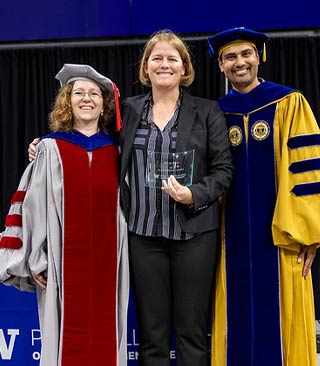 Nicki Dell is an Associate Professor at the Jacobs Technion-Cornell Institute at Cornell Tech and in the Bowers College of Computing and Information Science at Cornell University. Nicki works to investigate the impact of digital technologies on underserved communities and build systems and interventions that make our computer-mediated world safer and more equitable for everyone. Her research spans the fields of human-computer interaction, computer security and privacy, and information and communication technologies for development. She carries out her research in sustained partnership with affected communities to deepen her understanding of the challenges they face and to devise solutions that respond to both technological and social factors at play.
Nicki Dell is an Associate Professor at the Jacobs Technion-Cornell Institute at Cornell Tech and in the Bowers College of Computing and Information Science at Cornell University. Nicki works to investigate the impact of digital technologies on underserved communities and build systems and interventions that make our computer-mediated world safer and more equitable for everyone. Her research spans the fields of human-computer interaction, computer security and privacy, and information and communication technologies for development. She carries out her research in sustained partnership with affected communities to deepen her understanding of the challenges they face and to devise solutions that respond to both technological and social factors at play.
Nicki joined Cornell after earning her Ph.D. in Computer Science & Engineering at the University of Washington in 2015. She is the recipient of a MacArthur Fellowship (2024), SIGCHI Societal Impact Award (2023), and NSF CAREER Award (2018). At Cornell, Dell co-founded and co-directs the Clinic to End Tech Abuse. She is also Director for Technology Innovation for the Initiative on Home Care Work in the Center for Applied Research on Work (CAROW) and was the 2023 Siegel Faculty Impact Fellow for the Public Interest Technology Initiative.
John Colleran
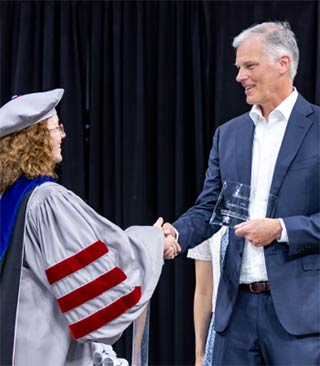 John graduated from the Paul G Allen School of Computer Science & Engineering with a Bachelor’s degree in 1987. He accepted a job with Microsoft, who insisted he start the Monday following Spring graduation because there was an urgent need to help ship OS/2 Presentation Manager, which did not ship until eighteen months later! Currently John manages Microsoft’s Developer Productivity team for the Windows and Azure Engineering Systems group. John and his team have created the WAVE suite of productivity tools and industry leading methods for measuring developer productivity for engineers. By combining a broad set of user telemetry, such as Window’s OS system interactivity info, with contribution indictors from various engineering systems, they have been able to effectively measure the value of engineering tools and the impact of engineering practices on engineering productivity.
John graduated from the Paul G Allen School of Computer Science & Engineering with a Bachelor’s degree in 1987. He accepted a job with Microsoft, who insisted he start the Monday following Spring graduation because there was an urgent need to help ship OS/2 Presentation Manager, which did not ship until eighteen months later! Currently John manages Microsoft’s Developer Productivity team for the Windows and Azure Engineering Systems group. John and his team have created the WAVE suite of productivity tools and industry leading methods for measuring developer productivity for engineers. By combining a broad set of user telemetry, such as Window’s OS system interactivity info, with contribution indictors from various engineering systems, they have been able to effectively measure the value of engineering tools and the impact of engineering practices on engineering productivity.
Over the last thirty-seven years at Microsoft, John has driven engineering investments in several areas. His first project was to write one of Microsoft’s first large scale fuzzing tools, the Random Testcase Generator, after early versions of Windows shipped with APIs that were unusable. He wrote many of the GUI Unicode APIs for Windows NT and to speed adoption of Unicode, he invented the Unicode layer library for shipping Unicode applications on legacy Windows systems. In 1992, he won the OS Division’s productivity award for his efforts in shipping Windows NT 3.1.
Following the release of NT 3.1, he managed the Window Manager aka User team for several releases. Here he helped re-architect the Windows GUI components to run in kernel mode to improve performance and reduce complexity. He created and patented Microsoft’s shimming mechanism for dynamically patching Windows applications. This enabled thousands of legacy applications that were incompatible with the NT architecture to run on the Windows NT codebase; a critical requirement for Windows XP to capture the consumer market. After XP, John moved on to run the Windows Deployment and Component Platform group. He and his team re-designed the Windows installation and servicing stack to be component manifest based. They also created a multicast carousel PXE boot system for Windows Deployment Services that was critical for scaling up Windows installation capabilities for large scale data center deployments.
John loves to spend time outdoors skiing, hiking, and exploring. He is an avid Husky fan and along with his spouse, Michelle, who he met at the UW, and their two children, attends many UW and CSE events. His daughter, Jessica, is a Senior at the UW Allen School, and his son, Joshua, is a rising Junior at Santa Clara University studying CSE as well.
Karen Liu
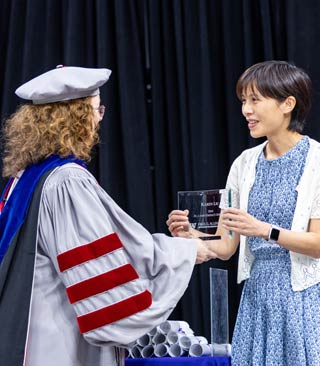 C. Karen Liu is a professor in the Computer Science Department at Stanford University. Liu’s research interests are in computer graphics and robotics, including physics-based animation, character animation, optimal control, reinforcement learning, and computational biomechanics. She developed computational approaches to modeling realistic and natural human movements, learning complex control policies for humanoids and assistive robots, and advancing fundamental numerical simulation and optimal control algorithms. The algorithms and software developed in her lab have fostered interdisciplinary collaboration with researchers in robotics, computer graphics, mechanical engineering, biomechanics, neuroscience, and biology. Liu received a National Science Foundation CAREER Award, an Alfred P. Sloan Fellowship, and was named Young Innovators Under 35 by Technology Review. Liu also received the ACM SIGGRAPH Significant New Researcher Award for her contribution in the field of computer graphics. In 2021, Liu was inducted to ACM SIGGRAPH Academy.
C. Karen Liu is a professor in the Computer Science Department at Stanford University. Liu’s research interests are in computer graphics and robotics, including physics-based animation, character animation, optimal control, reinforcement learning, and computational biomechanics. She developed computational approaches to modeling realistic and natural human movements, learning complex control policies for humanoids and assistive robots, and advancing fundamental numerical simulation and optimal control algorithms. The algorithms and software developed in her lab have fostered interdisciplinary collaboration with researchers in robotics, computer graphics, mechanical engineering, biomechanics, neuroscience, and biology. Liu received a National Science Foundation CAREER Award, an Alfred P. Sloan Fellowship, and was named Young Innovators Under 35 by Technology Review. Liu also received the ACM SIGGRAPH Significant New Researcher Award for her contribution in the field of computer graphics. In 2021, Liu was inducted to ACM SIGGRAPH Academy.
Janet Davis
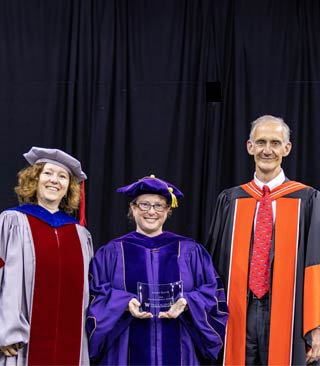 Janet Davis serves as Professor and Microsoft Chair of Computer Science at Whitman College in Walla Walla, Washington. As Whitman’s founding computer scientist and first department chair, she led hiring of CS faculty and development of Whitman’s new CS major. Over the past five years, the program has grown rapidly from the first two CS graduates in 2018 to eighteen CS graduates in 2023, with alumni landing positions at Amazon, Google, Meta, Microsoft, SpaceX, and beyond. Next year, Dr. Davis will serve as co-director of Whitman’s new interdisciplinary concentration in Human-Centered Design.
Janet Davis serves as Professor and Microsoft Chair of Computer Science at Whitman College in Walla Walla, Washington. As Whitman’s founding computer scientist and first department chair, she led hiring of CS faculty and development of Whitman’s new CS major. Over the past five years, the program has grown rapidly from the first two CS graduates in 2018 to eighteen CS graduates in 2023, with alumni landing positions at Amazon, Google, Meta, Microsoft, SpaceX, and beyond. Next year, Dr. Davis will serve as co-director of Whitman’s new interdisciplinary concentration in Human-Centered Design.
Prior to joining Whitman in 2015, Dr. Davis taught for nine years at Grinnell College in Iowa. In her final years at Grinnell, she served as Director of the Wilson Program in Enterprise and Leadership and developed an innovative, alumni-mentored, community-engaged software development curriculum. Dr. Davis’s research focuses on design methods for ethical persuasive computing. At Grinnell, she was awarded the Harris Faculty Fellowship to pursue participatory design of persuasive technology for sustainability in collaboration with the student Eco-House. Since her move to Whitman, Dr. Davis has explored the application of persuasive technology to influence writing and language use in support of gender equality. Her research program has engaged students in analysis of existing artifacts as well as software development. Dr. Davis’s most widely cited post-graduate work is the review article, “Value Sensitive Design: Applications, Adaptations, and Critiques,” co-authored with UW Information School alumna Lisa Nathan.
Dr. Davis earned her B.S. in Computer Science at Harvey Mudd College and her M.S. and Ph.D. in Computer Science & Engineering at the University of Washington. Read more about Janet here.
Paul Mikesell
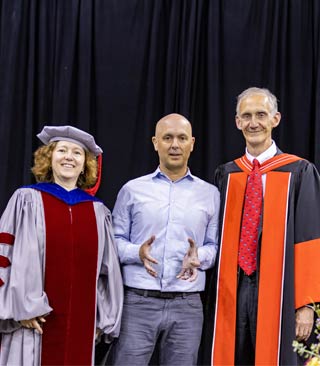 Paul Mikesell is the founder and CEO of Carbon Robotics. Paul has deep experience founding and building successful technology startups. Paul co-founded Isilon Systems, a distributed storage company, in 2001. Isilon went public in 2006 and was acquired by EMC for $2.5 billion in 2010. In 2006, he co-founded Clustrix, a distributed database startup that was acquired by MariaDB in 2018. Prior to Carbon, Paul served as Director of Infrastructure Engineering at Uber, where he grew the team and opened the company’s engineering office in Seattle, later focusing on deep learning and computer vision. Paul holds a bachelor’s degree in computer science from the University of Washington. Read more about Paul here.
Paul Mikesell is the founder and CEO of Carbon Robotics. Paul has deep experience founding and building successful technology startups. Paul co-founded Isilon Systems, a distributed storage company, in 2001. Isilon went public in 2006 and was acquired by EMC for $2.5 billion in 2010. In 2006, he co-founded Clustrix, a distributed database startup that was acquired by MariaDB in 2018. Prior to Carbon, Paul served as Director of Infrastructure Engineering at Uber, where he grew the team and opened the company’s engineering office in Seattle, later focusing on deep learning and computer vision. Paul holds a bachelor’s degree in computer science from the University of Washington. Read more about Paul here.
Brad Calder
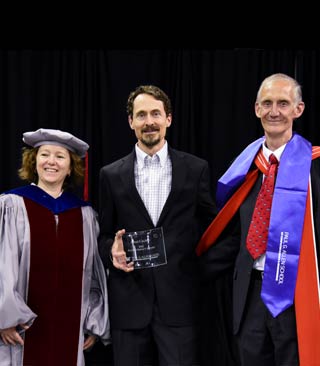
Brad Calder is the Vice President and GM of Google Cloud Platform and Technical Infrastructure at Google, where he manages product and engineering across these areas. Since joining Google Cloud in 2015, he helped Google Cloud evolve to become one of the leading cloud providers in the industry. Before coming to Google, he was a Vice President of Engineering for Microsoft Azure and was on the founding team that started Azure in 2006. Before that, Brad was a tenured professor at the University of California San Diego in the Department of Computer Science and Engineering where he graduated 14 Ph.D. students, and published over 100 papers in the areas of systems, architecture and compilers. In 2019, Brad was named an ACM Fellow, recognizing his contributions to cloud storage, processor simulation, and feedback-directed optimization of systems and applications. He received his B.S. in Computer Science from the University of Washington and Ph.D. in Computer Science from the University of Colorado Boulder.
Heather Underwood
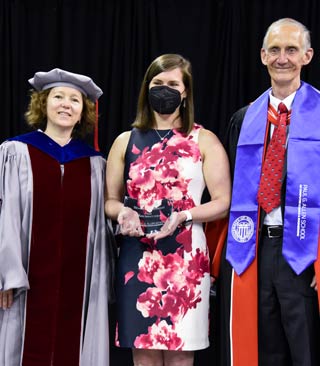
Dr. Heather Underwood is the CEO of EvoEndo, a pediatric and adult gastrointestinal endoscopy platform company. Underwood joined EvoEndo after completing the Stanford Biodesign Fellowship Postdoc for medical device innovation in 2019. She completed her Ph.D. at the University of Colorado Boulder’s ATLAS Institute where she developed and implemented clinical decision support systems for midwives and nurses in Kenya, receiving the NSF Graduate Research Fellowship Grant and a Gates Grand Challenges Grant to support her research. She has spent the last 10 years founding and leading medical device startups, non-profit life science organizations, and innovative academic initiatives including co-founding Inworks as an assistant professor at the University of Colorado Denver.
Emma Brunskill
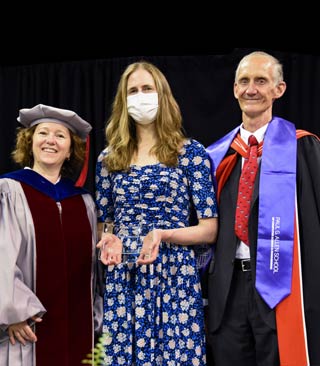 Emma Brunskill is an assistant professor in the computer science department at Stanford University where she leads the AI for Human Impact (@ai4hi) group. Her work focuses on reinforcement learning in high-stakes scenarios — how can an agent learn from experience to make good decisions when experience is costly or risky, such as in educational software, health care decision making, robotics or people-facing applications. She was previously on the faculty at Carnegie Mellon University. She is the recipient of multiple early faculty career awards, including from the National Science Foundation, the Office of Naval Research, and Microsoft Research. Her group has received several best research paper nominations and awards in top machine learning for education conferences and AI conferences.
Emma Brunskill is an assistant professor in the computer science department at Stanford University where she leads the AI for Human Impact (@ai4hi) group. Her work focuses on reinforcement learning in high-stakes scenarios — how can an agent learn from experience to make good decisions when experience is costly or risky, such as in educational software, health care decision making, robotics or people-facing applications. She was previously on the faculty at Carnegie Mellon University. She is the recipient of multiple early faculty career awards, including from the National Science Foundation, the Office of Naval Research, and Microsoft Research. Her group has received several best research paper nominations and awards in top machine learning for education conferences and AI conferences.
Kirk Glerum
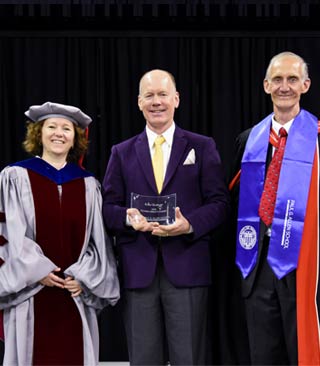 Kirk Glerum is a second-generation graduate of the University of Washington, his father Rolf having graduated with a Journalism degree in 1955. Kirk graduated in 1983 with a double major in Computer Science and Math. His first post-college job was on the Ave, working for RoseSoft, a (very) small software firm; the term ‘start-up’ had not yet been coined. From there he went to Microsoft for 22 years as a developer in Office. Kirk created Watson, Microsoft’s ‘crash reporting system,’ whereby many billions of user reports led to bugfixes, and thus enormous improvements in software quality. He is currently happily retired, puttering and bike riding.
Kirk Glerum is a second-generation graduate of the University of Washington, his father Rolf having graduated with a Journalism degree in 1955. Kirk graduated in 1983 with a double major in Computer Science and Math. His first post-college job was on the Ave, working for RoseSoft, a (very) small software firm; the term ‘start-up’ had not yet been coined. From there he went to Microsoft for 22 years as a developer in Office. Kirk created Watson, Microsoft’s ‘crash reporting system,’ whereby many billions of user reports led to bugfixes, and thus enormous improvements in software quality. He is currently happily retired, puttering and bike riding.
Joe Heitzeberg
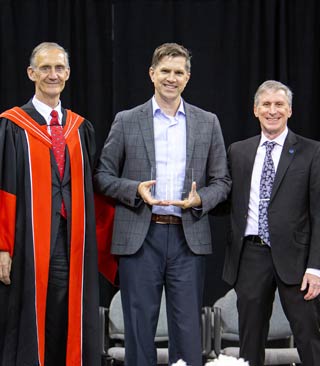 Joe Heitzeberg, a highly successful serial entrepreneur, received his Bachelors degree from the Allen School in 1995. He spent another two years at UW studying Technical Japanese, then began his career as a software engineer at Starwave, which at that time was a 2-year-old Paul Allen Company. In 2005, after spending two years earning an MBA from MIT’s Sloan School of Management, Joe joined Seattle’s startup world.
Joe Heitzeberg, a highly successful serial entrepreneur, received his Bachelors degree from the Allen School in 1995. He spent another two years at UW studying Technical Japanese, then began his career as a software engineer at Starwave, which at that time was a 2-year-old Paul Allen Company. In 2005, after spending two years earning an MBA from MIT’s Sloan School of Management, Joe joined Seattle’s startup world.
Today Joe is the CEO and co-founder of Crowd Cow. Crowd Cow’s mission is to help people discover and access the highest quality craft meats, and to bring people together — farmers and consumers, families and friends. The consumers are delighted, but the farmers are ecstatic, because Crowd Cow gets rid of the chain of middle-men whose goal is to commoditize meat with no concern for quality.
Prior to Crowd Cow, Joe was the co-founder and President of Madrona Venture Labs, the in-house startup incubator of Madrona Venture Group which produces venture-backed high tech startups. Before that, he was the founder and CEO of MediaPiston (acquired by oDesk in 2011) and Snapvine (acquired by WhitePages in 2008).
Tessa Lau
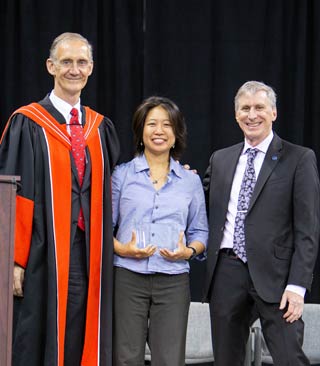 Tessa Lau received her doctorate from the Allen School in 2001, working with Dan Weld on machine learning with an emphasis on human-computer interaction and intelligent systems. (This was 18 years ago – many years before machine learning became cool and everybody started doing it.)
Tessa Lau received her doctorate from the Allen School in 2001, working with Dan Weld on machine learning with an emphasis on human-computer interaction and intelligent systems. (This was 18 years ago – many years before machine learning became cool and everybody started doing it.)
Tessa is an experienced entrepreneur with expertise in AI, machine learning, and robotics. She is currently Founder/CEO at Dusty Robotics, whose mission is to address construction industry productivity by introducing robotic automation on the job site. Prior to Dusty, she was CTO/co-founder at Savioke, where she orchestrated the deployment of 75+ delivery robots into hotels and high-rises. Previously, Tessa was a Research Scientist at Willow Garage, where she developed simple interfaces for personal robots. She also spent 11 years at IBM Research working in business process automation and knowledge capture.
Tessa is a leader in creating robots that do real work in the real world alongside real people. She develops technology that gives people super-powers, and builds businesses that bring that technology into people’s lives.
Yaw Anokwa
Yaw Anokwa has worked as an electrical engineer for Raytheon, a research scientist for Intel, an informatician for Partners in Health, and a software engineer for Google. He calls on these experiences in engineering, management, and academia to solve meaningful problems in developing communities. Since 2011, Yawhas worked at Nafundi, a software consulting company he co-founded to create technologies that improve the lives of underserved populations, with an emphasis on replacing paper-based workflows with mobile apps built on the Open Data Kit (ODK) platform.
Yaw co-created ODK, a set of free, customizable mobile and cloud-based tools for data collection, while earning his Ph.D. under the guidance of the late professor Gaetano Borriello and alumnus Tapan Parikh (Ph.D., ’07), earning his Ph.D. in 2012. Organizations around the world have used ODK to collect and act on digital records for a variety of purposes, including public health, wildlife conservation, elections monitoring, and more. Thanks in part to Yaw’s efforts to build a robust community within the ODK ecosystem, the ODK website has seen traffic from nearly every country, and millions of users are estimated to have used ODK or its derivatives worldwide. Yaw also contributed to OpenMRS, an open-source, electronic medical records system designed to improve patient care that is used in more than 50 countries.
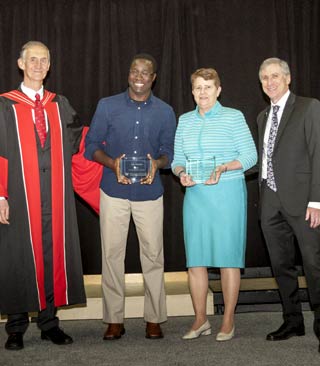 Yaw was honored for his contributions with the UW College of Engineering’s Diamond Award for Distinguished Service in 2015. He previously received the 2011 UW Graduate School Medal recognizing his efforts to combine academic expertise with social awareness to promote political, cultural, and social change. Before arriving at UW, Yaw simultaneously earned bachelor’s degrees in computer science and electrical engineering from Butler University and Indiana University–Purdue University Indianapolis, respectively.
Yaw was honored for his contributions with the UW College of Engineering’s Diamond Award for Distinguished Service in 2015. He previously received the 2011 UW Graduate School Medal recognizing his efforts to combine academic expertise with social awareness to promote political, cultural, and social change. Before arriving at UW, Yaw simultaneously earned bachelor’s degrees in computer science and electrical engineering from Butler University and Indiana University–Purdue University Indianapolis, respectively.
Read more about Yaw’s career and achievements here.
Eileen Bjorkman
Eileen Bjorkman’s career took off — literally and figuratively — following her graduation from UW. She earned her bachelor’s degree in Computer Science in 1979. After a brief stint as a programmer, she joined the United States Air Force and earned a second degree in aeronautical engineering. She would become only the sixth woman to enroll in the Air Force’s Test Pilot School, and subsequently notched over 700 hours of flight time in more than 25 different aircraft as a flight test engineer, instructor, and test squadron commander.
On the ground, Eileen combined her background in computing and aviation in a variety of staff and director positions involving modeling, simulation, analysis and joint testing. She was in charge of air-to-air combat modeling to evaluate how adjustments to a jet’s aerodynamics and systems would affect the outcome of dogfights. She later commanded the 846th test squadron, overseeing the testing of high-speed missile delivery systems at the Holloman High-Speed Test Track, and the 746th, testing global positioning system (GPS) satellites. Upon her retirement from active duty, Eileen continued to serve her country in a civilian capacity. She is currently the Deputy Director of Programs, Deputy Chief of Staff for Strategic Plans, Programs and Requirements, overseeing the $605 billion Future Years Defense Plan for investing in technology, equipment, and personnel.
Along the way, Eileen earned two master’s degrees — in aeronautical engineering and national resource strategy — and a Ph.D. in systems engineering from The George Washington University. In her spare time, she has clocked more than 2,000 hours of civilian flight time. An avid writer, Eileen has penned articles for Air & Space Magazine, Aviation History, the Daily Herald of Everett, and others. In 2017, she fulfilled a lifelong dream by publishing her first book, The Propeller under the Bed: A Personal History of Homebuilt Aircraft.
Read more about Eileen’s career and achievements here.
A.J. Bernheim Brush
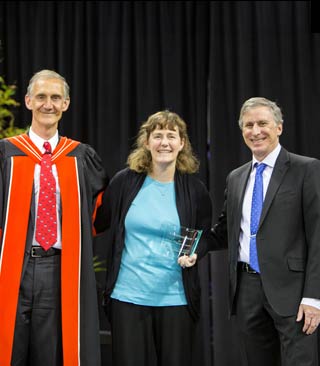 A.J. Bernheim Brush is a researcher in Human-Computer Interaction with a focus on Ubiquitous Computing and Computer Supported Collaboration. She is most well known for her research on technologies for families and her expertise in conducting field studies of technology. Currently embedded in a Microsoft product group since January 2016, she spent the previous 11 years in Microsoft Research, where she co-led the Lab of Things project, a flexible, open-source platform for conducting experimental research on projects for the connected home, including home automation, energy management, and home healthcare. A.J.’s interest in cooperative work and field evaluation began during her time as a graduate student working with Allen School professor Alan Borning. Her Ph.D. dissertation, Annotating Digital Documents for Asynchronous Collaboration, focused on the role of co-author discussions anchored at a particular part of the document versus the document as a whole — pioneering work that required her to build systems as well as perform careful user studies of how those systems were employed in practice.
A.J. Bernheim Brush is a researcher in Human-Computer Interaction with a focus on Ubiquitous Computing and Computer Supported Collaboration. She is most well known for her research on technologies for families and her expertise in conducting field studies of technology. Currently embedded in a Microsoft product group since January 2016, she spent the previous 11 years in Microsoft Research, where she co-led the Lab of Things project, a flexible, open-source platform for conducting experimental research on projects for the connected home, including home automation, energy management, and home healthcare. A.J.’s interest in cooperative work and field evaluation began during her time as a graduate student working with Allen School professor Alan Borning. Her Ph.D. dissertation, Annotating Digital Documents for Asynchronous Collaboration, focused on the role of co-author discussions anchored at a particular part of the document versus the document as a whole — pioneering work that required her to build systems as well as perform careful user studies of how those systems were employed in practice.
A.J. is a Senior Member of the Association for Computing Machinery and a current board member and past chair of CRA-W, an organization that works to increase the number of women in computing research. She received an Anita Borg Early Career Award in 2010 for significant contributions to her profession through her research and outreach to women. A.J.’s research has earned her a 10-year Impact Award, two Best Paper awards, and several Best Paper nominations. A.J. regularly serves on the program committees for high-profile conferences in the field, including UbiComp, Pervasive, CHI, and CSCW. Before her arrival at UW, A.J. graduated summa cum laude from Williams College in 1996 with a double major in Computer Science and Mathematics.
Read more about A.J.’s career and achievements here.
Hakim Weatherspoon
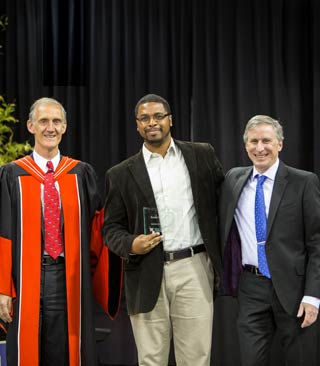 Hakim Weatherspoon is an associate professor in the Department of Computer Science at Cornell University. His research interests cover various aspects of fault-tolerance, reliability, security, and performance of internet-scale data systems such as cloud and distributed systems.
Hakim Weatherspoon is an associate professor in the Department of Computer Science at Cornell University. His research interests cover various aspects of fault-tolerance, reliability, security, and performance of internet-scale data systems such as cloud and distributed systems.
Hakim earned his bachelor’s degree in Computer Engineering with a minor in Mathematics from the University of Washington, where he also played in four consecutive bowl games as a Husky football player. He went on to earn his Ph.D. from the University of California, Berkeley, in the area of secure and fault-tolerant distributed wide-area storage systems. His Ph.D. dissertation, The Design and Evaluation of Distributed Wide-Area Online Archival Storage Systems, focused on systems that could store global data durably, verifiably, and with minimal maintenance. He and Berkeley colleagues built Antiquity, part of the OceanStore project, to create a simple storage service and interface for applications that used a secure log maintained on multiple servers to ensure data integrity — work that is credited with helping to lay the foundation for modern cloud storage systems.
Weatherspoon has earned a number of accolades for his many contributions, including an Alfred P. Sloan Research Fellowship; National Science Foundation CAREER Award; and a Kavli Fellowship from the National Academy of Sciences. He serves as Vice President of the USENIX Board of Directors and is the Founder and General Chair for the Association for Computing Machinery’s 2017 SIGOPS/SIGMOD Symposium on Cloud Computing. Hakim has also been recognized for his work to promote diversity, earning Cornell’s Zellman Warhaft Commitment to Diversity Award in 2014. Since 2011, he has organized the annual SoNIC Summer Research Workshop to help prepare between 15 and 25 students from underrepresented groups to pursue their Ph.D. in computer science. Allen School Alumni Achievement Award
Read more about Hakim’s career and achievements here.
Albert Greenberg
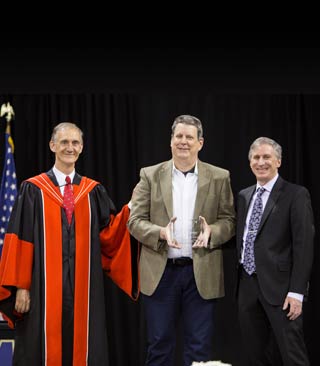 Albert Greenberg has worked on the front lines of grand scale networking and cloud computing for more than two decades, first at Bell Labs/AT&T and then at Microsoft. Albert earned his Ph.D. at UW CSE in 1983 working on the development of efficient algorithms for multiple access channels alongside professors Richard Ladner and Martin Tompa. Before his arrival at UW CSE, he earned his Bachelor’s in Mathematics from Dartmouth College.
Albert Greenberg has worked on the front lines of grand scale networking and cloud computing for more than two decades, first at Bell Labs/AT&T and then at Microsoft. Albert earned his Ph.D. at UW CSE in 1983 working on the development of efficient algorithms for multiple access channels alongside professors Richard Ladner and Martin Tompa. Before his arrival at UW CSE, he earned his Bachelor’s in Mathematics from Dartmouth College.
At Bell Labs/AT&T in New Jersey, Albert rose to division manager for network measurement engineering and research, and then to executive director and AT&T Fellow. He returned to Seattle in 2007, joining Microsoft as a Principal Researcher. For the past six years he has served as Distinguished Engineer and Director of Development for Microsoft’s Azure Networking, the company’s global cloud computing infrastructure platform that spans millions of servers around the globe and helps make Seattle the leader in cloud computing. Albert’s responsibilities encompass physical and virtual data center networking design and management, overseeing teams in Redmond, Mountain View, Hyderabad, Dublin, and Beijing.
The UW CSE Alumni Achievement Award is the latest in a string of honors for Albert. Earlier this year he was elected to the National Academy of Engineering – the profession’s highest honor. He is a Fellow of the Association for Computing Machinery and has received the SIGCOMM Award for his lifetime contribution to the field of communications networks, the IEEE Koji Kobayashi Computers and Communications Award, and multiple “Test of Time” awards for his research.
Read more about Albert’s career and achievements here.
Stefan Savage
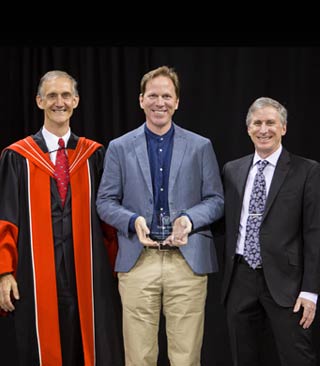 As a leader in the Systems & Networking and Computer & Network Security groups at the University of California San Diego, professor Stefan Savage has tackled everything from computer worms and online scams, to distributed attacks, insidious global consumer fraud networks, and automobile systems hacking. He is being honored twice this month for his outstanding research in network security and efforts to fight cyber crime: tonight he receives the UW CSE Alumni Achievement Award, and tomorrow, he collects the 2015 ACM-Infosys Foundation Award in the Computing Sciences.
As a leader in the Systems & Networking and Computer & Network Security groups at the University of California San Diego, professor Stefan Savage has tackled everything from computer worms and online scams, to distributed attacks, insidious global consumer fraud networks, and automobile systems hacking. He is being honored twice this month for his outstanding research in network security and efforts to fight cyber crime: tonight he receives the UW CSE Alumni Achievement Award, and tomorrow, he collects the 2015 ACM-Infosys Foundation Award in the Computing Sciences.
Stefan earned his Ph.D. from UW CSE in 2002 working with professors Brian Bershad and Tom Anderson. His route to computer science academia was unorthodox. Having begun his studies as an undergraduate at Carnegie Mellon University in physics and cognitive science, he wound up earning a degree in applied history instead. He then spent two years working in a computer science lab at CMU before following Bershad to Seattle, earning admission to UW CSE’s doctoral program a year later.
Stefan received job offers from MIT, Stanford, UC Berkeley, CMU, Cornell, UCSD, and several others. He joined UCSD for the cultural fit and turned his attention to battling cyber drug crime and shutting down counterfeit software sales by tracking the flow of money. Stefan also co-founded the Center for Automotive Embedded Systems Security with UW CSE professor Yoshi Kohno to draw attention to the security vulnerabilities of modern automobile systems, and established the Center for Evidence Based Security Research in collaboration with the International Computer Science Institute at Berkeley. He won the SIGOPS Mark Weiser Award in 2013, earning plaudits for his “uncanny ability to ask exactly the right question, propose exactly the right solution, and see that solution through to impact.
Read more about Stefan’s career and achievements here.
Kevin Jeffay
Kevin Jeffay received his Ph.D. from UW CSE in 1989 where he worked with Alan Shaw in the area of real-time operating systems. He has spent his entire 26-year post-CSE career at the University of North Carolina at Chapel Hill, where he is now the Gillian T. Cell Distinguished Professor of Computer Science, and Chair of the Department of Computer Science — the nation’s second-oldest computer science department.
Jeffay helped build the real-time systems program at UNC and, to attract students, established a multimedia group working on the then radical idea of processing audio-video in real time on a computer. Current high-profile research in the CS department includes a partnership with the physics department in developing the nanoManipulator, a virtual reality interface for scanned-probe microscopes. It can visualize an individual atom or clumps, and measures the mechanical forces required to bend a carbon nanotube. Another current project focuses on a free-space optical airborne communications network that would provide Internet service to homes across the U.S. through equipment installed on commercial aircraft.
An additional point of pride for those of us in UW CSE is that Kevin has always been deeply engaged with students. He’s won multiple awards for his teaching, and for many years he’s coached UNC’s team in the ACM International Collegiate Programming Contest, including two trips to the World Finals.
Read more about Kevin’s career and achievements here.
Tim Paterson
Tim Paterson’s email address is DosMan @ PatersonTech.com. In the most succinct possible way, that tells the story. Tim was among the first UW undergraduate alums in Computer Science. He received his Bachelors degree in 1978.
After graduating he joined a tiny company called Seattle Computer Products (SCP) as its only engineer. Tim designed a single-board computer based on Intel’s new 8086 processor, which SCP started shipping in 1979. The computer needed an operating system, so Tim designed a system called 86-DOS, which SCP started shipping in 1980. Microsoft came knocking around that time; Microsoft first licensed and then purchased 86-DOS from Seattle Computer Products. When the first IBM PC shipped in 1981, it was running that system — re-branded by IBM as PC DOS. Tim worked on several additional releases of the system, both at Seattle Computer Products and at Microsoft.
His life has taken many interesting turns since that time — from 8 years on the Visual Basic team to 5 years of competing in BattleBot tournaments.
Read more about Tim’s career and achievements here.
Jeff Dean
Jeff Dean received his PhD from UW CSE in 1996 where he worked with Craig Chambers on whole-program optimization techniques for object-oriented languages. He joined Google in mid-1999 and currently is a Google Senior Fellow in the Knowledge Group. His areas of interest include large–scale distributed systems, performance monitoring, compression techniques, information retrieval, application of machine learning to search and other related problems, microprocessor architecture, compiler optimizations, and development of new products that organize existing information in new and interesting ways. Products Jeff has developed for Google include AdSense, MapReduce, BigTable, and Google Translate.
Prior to joining Google, he was at DEC/Compaq’s Western Research Laboratory, where he worked on profiling tools, microprocessor architecture, and information retrieval. Prior to graduate school, he worked at the World Health Organization’s Global Programme on AIDS, developing software for statistical modeling and forecasting of the HIV/AIDS pandemic.
Read more about Jeff’s career and achievements here.
Gail Murphy
Gail Murphy received her PhD from UW CSE in 1996 where she worked with David Notkin. My research interests are in software engineering with a particular interest in improving the productivity of knowledge workers, including software developers. She is a Professor in the Department of Computer Science and Associate Dean (Research & Graduate Studies) in the Faculty of Science at the University of British Columbia. I am also a co-founder and Chief Scientist at Tasktop Technologies Incorporated.
Gail has accrued a long list of honors since her UW graduate student days. Recent ones include the 2013 International Conference on Software Engineering award for “Most Influential Paper 10 Years Later,” the 2011 ACM SIGSOFT Retrospective Impact Paper Award, and a 2010 double header with the ACM Distinguished Scientist and ISCE Distinguished Paper awards. UW Engineering recognized her early career achievements with a 2008 Diamond Award.
Read more about Gail’s career and achievements here.
Anne Dinning
Anne Dinning received her Bachelors degree from UW CSE in 1984, where she did research with Professor Richard Ladner. After working in Seattle for a year, she moved to New York and received her PhD in computer science from the Courant Institute at NYU. She turned down a number of attractive faculty positions to become an early employee of D. E. Shaw, the hedge fund established by Columbia University computer science professor David Shaw. Today Anne is “first among equals” on the executive committee that oversees D. E. Shaw’s more than 1,000 employees, managing $26 billion in investment capital.
Edward Felten
Edward Felten, a Caltech physics undergraduate, worked for several years as an analyst with Caltech’s Concurrent Computing Project before earning his PhD from UW CSE in 1993, where he worked with Ed Lazowska and John Zahorjan. He then joined the computer science faculty at Princeton University, transitioned to computer security as a research area, and developed a strong interest in public policy related to information technology. In addition to being a professor in Princeton’s Department of Computer Science, he is a Professor in Princeton’s Woodrow Wilson School of Public Affairs, and the Director of Princeton’s Center for Information Technology Policy; he recently spent two years in Washington DC on leave from Princeton as the first Chief Technologist of the Federal Trade Commission. Ed was elected to the American Academy of Arts & Sciences in 2011, and to the National Academy of Engineering in 2012.
John K. Bennett
John K. Bennett (PhD ’88) is an expert in the design, implementation, and evaluation of distributed systems. After teaching at Rice University, he joined the faculty at University of Colorado at Boulder in 2000, where he holds an endowed professorship in computer science and is a professor of electrical and computer engineering. He also served as associate dean of engineering and sciences, and now directs the ATLAS Institute, the Alliance for Technology, Learning, and Society – a campus-wide entrepreneurial catalyst and incubator for innovative interdisciplinary research, education, and creative work.
Wen-Hann Wang
Wen-Hann Wang’s (PhD ’89) educational and career odysseys have crossed four continents. Our man of the world is also our man at Intel, where he is vice president of Intel Labs in Hillsboro, Oregon, and director of circuits and systems research. A new area of responsibility is looking at how to apply circuit technologies to solve biological challenges. During more than 20 years at Intel, Wang’s assignments have included two postings to Shanghai and dozens of trips abroad to Russia, the Middle East, and Latin America. Closer to home travels include spring and fall visits to Seattle as Intel’s liaison to the UW.
Anne Condon
Anne Condon (PhD ’87) is a computer science theoretician whose research has moved in a purposeful direction from complexity theory to DNA computing and algorithms for biology. After twelve years at the Computer Science faculty at the University of Wisconsin in Madison, she moved to the University of British Columbia in Vancouver, where she will become head of the Department of Computer Science in July. Besides research— currently focused on predicting secondary structures of nucleic acid polymers— Condon has a passion for mentoring emerging researchers, particularly undergraduate women. She is an ACM Fellow and the recipient of the 2010 A. Nico Habermann Award for service.
Jeremy Jaech
Jeremy Jaech (MS ’80) has founded some of the best-known and most innovative software companies in the Pacific Northwest, including Aldus (a pioneer in desktop publishing), Visio (technical drawing software now part of Microsoft Office), and Trumba (web-based event promotion). In 2008, Jeremy assumed the CEO role at Verdiem (power management software), where he successfully turned the company around financially. He is currently in residence on the fifth floor of the Paul G. Allen Center, exploring his next move.
Greg Andrews
Greg Andrews (PhD ’74) was one of the first PhD students in the program, working with Alan Shaw (now emeritus) on computer security and earning his degree in 1974. Over the course of a thirty-six-year career in academia, he has twice served as department chair at the University of Arizona, authored three textbooks, and is a fellow of the Association for Computing Machinery.
Robert Short
Rob Short’s (MS ’87) remarkable professional journey began in his native Ireland, where he earned a two-year electronics degree from the Cork Institute of Technology, a trade school. Starting his career at Digital Computer Corporation (DEC) in Galway, he was invited to the US to work on the pioneering VAX families of minicomputers, first in Massachusetts and later in Washington State. Working with Hank Levy, he earned his MS degree in 1987 and joined Microsoft in 1988 to work on Windows NT (progenitor of Windows XP and Windows 7). By 2000 he was a corporate vice president. Rob retired in 2007 to devote himself to non-profit work, helping found See Your Impact, a pioneering philanthropic organization.
Please note: No Alumni Impact Awardees were chosen in 2021 due to the COVID-19 pandemic.
